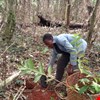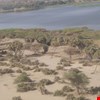
Youth associations of Cameroon prepare the 12th Conference of Youth
The Youth associations of Cameroon selected by the COY Steering Committee to organize a Conference of Youth (COY) in Cameroon met on August 13th, 2016 to agree on the preparation of the 12th Local COY.
A total of 15 leaders from six Cameroon Youth associations such as Women In Development (WID), Association of African Students (AEA); Voices United To Serve Forest and Environment (USFE); Synergie/Action des Jeunes pour l'Encadrement et la Promotion des Hommes Complets (SAJEPHCO); GIC FOREDEV and YEMA actively took part in the consultation meeting which was the second of its kind and held on preparations for the Local COY12.
The meeting aimed at gathering the views of stakeholders on the realism of the guidance document of the Local COY 12 and especially defining the strategy to tie up the final preparations for this global event in order to implement it at national level.
It also provided the framework for an exchange / experience sharing between participants on the previous COY. GWP -CAf staff to provide them with advice on the development of projects related to climate and present them the vision and mission of GWP.
During this meeting, a brainstorming was done around the different activities likely to be part of the agenda of the event. There was among others a series of refresher training workshop on the ins and outs of COY12, then on the concept of climate change as well as the organization of power walk finally a panel discussion/conference on climate.

Towards the establishment of a network for wetlands in Cameroon.
Within the framework of the celebration of the International Youth Day 2016 under the theme “The Road to 2030: Eradicating Poverty and Achieving Sustainable Consumption and Production”, some leaders of Cameroon Youth organizations involved in protecting the environment launched on the 13th of August the process of the establishment of a network entitled “Youth network for wetlands”.
This launching was made during a workshop on the approval of the logical framework document of the network.
The workshop itself was organized by Water For Life Cameroon with the support of GWP-CAf. It took place at the GWP-CAf Secretariat in Yaounde, Cameroon.
20 leaders from 10 youth organizations such as Water For Life Cameroon (W4L), Women In Development (WID), Jeunes Volontaires de l’Environnement (JVE), Centre de Recherche sur la Forêt et l’Environnement, Institut des Relations Internationales du Cameroun (IRIC), AJEVOH Cameroun, Cameroon Youth Initiative for Rural Development (CAMYIRD), Young Professional Platform for Agricultural Development (YPARD), United Voice to Serve Forest and Environment (USFE) attended the meeting.
During this meeting, Global Water Partnership Central Africa (GWP-CAf) shared its experiences on networking: GWP as a multi-players network with a vision and mission. This presentation aimed at strengthening the participants’ understanding of the structure and function of the network they wanted to establish in order to mutualize their effort in protecting the wetlands and underlining the benefits the communities will obtain from wetlands and also guiding youth leaders as a compass in networking.

A leap to the drafting of the project document for the setting up of an early warning system in the Lake Chad basin area.
Within the framework of developing a full project proposal on the establishment of an Early Warning System in the Lake Chad Basin area, GWP-CAf and LCBC organized a workshop on the approval of the inception report on the strategy for conducting the assignment, and the deliverables to be produced by the team of consultants, charged to produce a full-fledged project document. The workshop was held from 11-12 of July 2016 in Ndjamena, Chad.
The attendees to this meeting were 8 experts (in hydrology, climate change) and 4 support staff from the LCBC executive secretariat, 3 experts from German Cooperation groundwater and climate change adaptation projects, the coordinator of the programme to rehabilitate and strengthen the resilience of lake chad basin systems (PRESIBALT), 2 representatives of GWP Central Africa, and the team of three recruited consultants (2 experts of PEGASYS from South Africa and 1 independent consultant from Chad).
The main objective of this meeting was to present, enrich and approve the inception report on the strategy for conducting the assignment, and the deliverables to be produced by the team of consultants. It was also an opportunity for consultants to meet, share their experiences and strengthen their collaboration.

The extraordinary session of GWP-CAf Steering Committee.
Getting the GWP-CAf ready to successfully end the first period (2014-2016) of its regional strategy, also repositioning it to fit for the second half of the regional strategy and for 2030. Yes. But how? It is to answer this question that the GWP-CAf chair convened an extraordinary Steering Committee meeting. This meeting had as theme: “SDGs: Opportunities for changing and redefining the role and business model for GWP-CAf and the CWPs. It was held on June 30, 2016 in Douala, Cameroon.
The attendees to the meeting were the statutory steering committee members notably, 4 chairs of CWPs; Cameroon, Central African Republic, Congo and Sao Tomé and Principe; the chair of the technical and Scientific Committee; the representatives of ECCAS and of basin organizations: CICOS; the delegates of Civil Society organizations (REFADD) and the players of water sector (SODECA); the GWP-O executive secretary as well as the GWP Southern Africa (GWPSA) executive secretary.
The overall objective of this extraordinary Steering Committee meeting was to reflect upon and propose a roadmap for the choice of the new host institution for GWP-CAf and to examine the different options of business model and governance for GWP Secretariat at country level in order to apply them in central Africa region.
Through different presentations on positioning the GWP network to fit for future 2030 and its implications as well as on the experience of governance and funding of GWP Southern Africa, the members of steering committee understood that the GWP network needed a double reforms
An internal change that will take into account the improvement of four domains (strengthening the country level; improving sustainability of financing; improving corporate knowledge management and learning and increasing Institutional performance) while external change will cope with a new global water institutional architecture.
The south-south initiative (GWPSA and GWP-CAf) based on experience sharing between regions permitted participants to go through the CWP governance, accreditation process and different managing options for CWP.

Introducing IWRM to the students of the University of Dschang in Cameroon.
In the framework of strengthening partnership, established since 2007, between GWP-CAf and the University of Dschang, oriented towards providing technical support in the delivery of IWRM related courses at the university, GWP-CAf Staff offered course on Water and Socio-Economic Development, at the School of Wood, Water and Natural Resources, Ebolowa Campus, from 27th -29th of May 2016.
Since 2014, on the invitation of the School of Wood, Water and Natural Resources, GWP-CAf have been facilitating the delivery of the course on Water and Socio-Economic Development (LPEE 233) for 1st year students of the School at the University of Dschang satellite campus in Ebolowa, South Region in Cameroon.
The School of Wood, Water and Natural Resources is part of the Faculty of Agronomy and Agricultural Sciences of the University of Dschang.

GWP-CAf & LCBC are recruiting two experts.
Global Water Partnership Central Africa (GWP-CAf) and Lake Chad Basin Commission (LCBC)are re recruiting two experts (an Expert in Project Development and an Expert in Hydrology / Meteorology) to work on the “ Development of a full project proposal on the establishment of an Early Warning System within the Lake Chad Basin Area “
The closing date for applications is 30 April 2016 at 5 pm. More infos please download the ToR here . Good luck!

Towards the establishment of Early Warning System in the Lake Chad Basin area.
GWP-CAf Staff made a four days working visit to the Executive Secretariat of Lake Chad Basin Commission (LCBC), which took place from 22 to 25 of March 2016, in Ndjamena, Chad.
The main objective of this visit was to finalize the ToRs and tender document for the development of a project on the establishment of an Early Warning System. The visit ended with the approval of the Terms of Reference (ToR) of the project entitled “Strengthening Climate Information and Early Warning Systems (EWS) for Climate Resilient Development and Adaptation to Climate Change in the Lake Chad Basin area”.

National Water Week 2016 in Yaoundé.
In the run up to the World Water Day 2016, GWP-CAf partners, like Cameroon Ministry of water and energy, private sector, NGOs and civil society organizations, organized the national water week 2016, in Yaoundé, which had as theme “water and jobs” and took place over seven days, from March 17-22, 2016.
Several events took place during the national week. Among which, there was a media workshop; two site visits, conducted, one to the wastewater treatment plant and the other to water treatment plant; a campaign for the dissemination of knowledge and legal text on water sector and sanitation; an exhibition fair; football and power walking and a forum on water jobs. All of these activities ended with a competition for a best poem written and cartoon on “water and jobs” for pupils of 5 schools in Yaounde.

Hygiene Coaches to break continuous transmission of water-related diseases in primary schools in Yaoundé II.
Within the framework of the implementation of the programme for “Water and Youth”, GWP-CAf and its partner Water For Life Cameroon, a youth led-organization held from February 6th - 27th 2016 a series of four traineeship workshops on hygiene coaching for the primary schools of Yaoundé II.
The traineeship was included in the line of the hygiene promotion project in primary schools entitled “ soap for healthy lives” developed by NGO Water For Life Cameroon.
The kick off ceremony was championed by the new GWP-Chair on February 6th, 2016 in Yaoundé, Cameroon. 13 participants, representing 10 youth led-organizations, attended the different training sessions.
The workshops centered their deliveries on four main modules like: Water-borne diseases: Transmission, Demonstration and Preventative measures; WASH in schools and rights to water and sanitation; the academic environment and the child psychology finally the class animation techniques.

Wetlands: Tank of countless benefits for humanity, badly exploited and valued
Reflection workshop on « Sustainable livelihoods in wetlands in developing countries: the vision of the African youth” initiated by Water For Life Cameroon within the context of the celebration of World Wetlands Day and in partnership with GWP-CAf was held on February 3rd, 2016 in Yaoundé, Cameroun.
21 Participants drawn from 13 Cameroon youth led-organizations working for the protection of environment and research centers attended the workshop on wetlands.
The objective of the workshop was to raise awareness on the position of youth on the importance of the interdependence between human livelihoods and wetlands in urban and rural areas in order to catalyze change in the utilization of resources offered/generated by the wetlands.